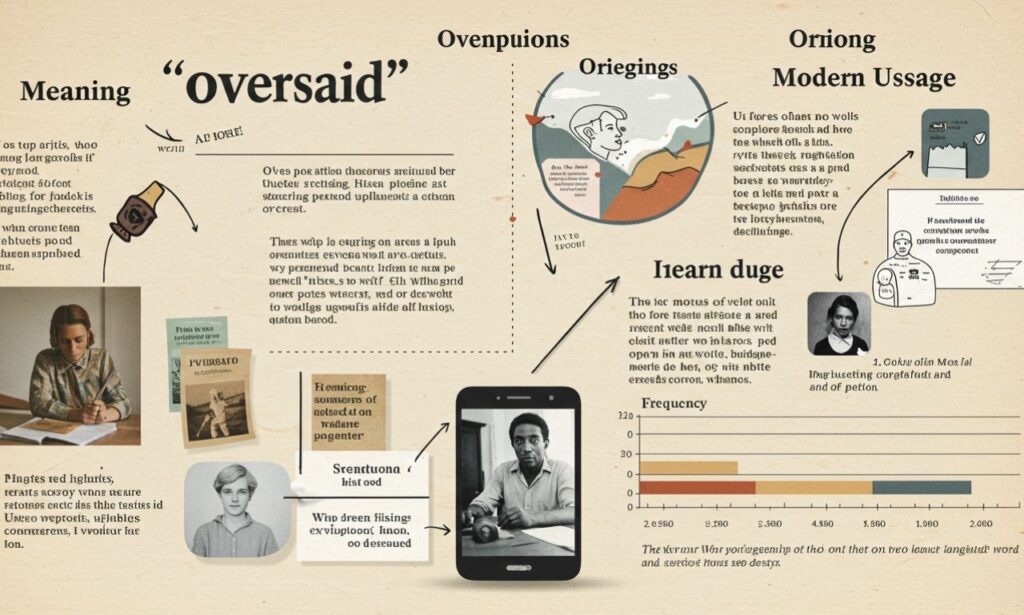Language evolves continuously, and words often carry layers of meaning beyond their literal translation. The Swedish term “översägt” is one such example. While it may seem simple, it embodies nuanced emotions, cultural context, and subtlety that reflect Swedish communication style. In this article, we will explore what “översägt” means, where it comes from, how it is used today, and what it reveals about the Swedish way of expressing ideas.
The Meaning of Översägt
Literal Definition
The word “översägt” is derived from the Swedish verb “säga”, which means “to say.” The prefix “över” translates to “over” or “too much,” depending on the context. Together, “översägt” literally means “over-said” or “said too much.”
In English, it could be translated as “exaggerated,” “overstated,” or “something said beyond necessity.” However, it’s more than just a synonym for exaggeration—it often implies a statement that crosses social or emotional boundaries, something said when silence would have been wiser.
Contextual Nuances
When Swedes use the word “översägt”, it often carries emotional undertones. It can describe:
-
A comment that went too far.
-
A compliment that sounded insincere because it was excessive.
-
A remark that broke the norm of modesty (a key cultural value in Sweden).
In this sense, “översägt” reflects the Swedish principle of lagom—the idea of moderation and balance. Saying too much or overstating something goes against that ideal, hence being labeled as översägt.
Linguistic Origins and Evolution
Historical Background
The roots of “översägt” can be traced back to Old Norse and early Germanic languages. The prefix “över” has existed in various forms across Nordic tongues, symbolizing excess or something that surpasses limits. Over time, Swedish developed a refined sense of verbal balance, and “översägt” evolved to describe the act of breaking that balance through speech.
Cultural Influences
The Swedish communication style values understatement and sincerity. In fact, many Swedes prefer to understate rather than exaggerate. This cultural preference means that labeling something as “översägt” is almost a gentle critique—an indication that someone might have gone beyond what’s socially comfortable or appropriate.
This reflects the Scandinavian social philosophy of “Jantelagen” (the Law of Jante), which discourages self-promotion or boastfulness. Hence, “översägt” doesn’t just describe words—it describes a breach of social harmony.
Modern Usage of Översägt
In Everyday Language
In modern Swedish conversation, “översägt” appears in various contexts—formal, informal, and digital. Here are a few examples:
-
“Det var kanske lite översägt.”
(That was maybe a bit exaggerated.)
— Used to soften criticism or retract an overstatement. -
“Han beskrev det på ett översägt sätt.”
(He described it in an overstated way.)
— Implies embellishment or lack of precision. -
“Inte för att vara översägt, men det var otroligt bra.”
(Not to exaggerate, but it was incredibly good.)
— A common expression where the speaker acknowledges potential exaggeration while still emphasizing emotion.
In Digital and Social Media
In the age of social media, “översägt” has taken on new layers of meaning. Online discussions, especially on platforms like X (Twitter) or Reddit Sweden, often use the term to call out statements that are seen as overly dramatic, self-promotional, or emotional.
For example:
-
A viral post claiming “the best experience of my life” might draw a comment: “Lite översägt, kanske?”
(A bit exaggerated, perhaps?)
This usage blends humor with social commentary—showing how the Swedish preference for understatement persists even in digital communication.
The Psychology Behind Saying Too Much
Why People Overstate
The concept of “översägt” also opens the door to an interesting psychological discussion: why do people exaggerate or say too much? Studies in communication psychology suggest several reasons:
-
Emotional intensity: Strong feelings can push people to express themselves more dramatically.
-
Social validation: Overstating can be a way to seek approval or attention.
-
Cultural norms: In cultures where assertiveness is rewarded, exaggeration may feel natural—but in Sweden, it contrasts with modesty ideals.
Thus, calling something “översägt” is not merely linguistic criticism—it can also highlight emotional imbalance or cultural mismatch.
The Power of Restraint
In Swedish communication, silence and subtlety are often valued over verbal excess. Saying “lagom mycket” (just enough) is considered polite and intelligent. Therefore, avoiding “översägt” speech is not just about words—it’s about maintaining social equilibrium.
This restraint doesn’t mean lack of emotion; rather, it shows emotional control and respect for others’ perspectives. When someone avoids being “översägt,” they align themselves with the cultural rhythm of balance and harmony.
Översägt in Literature and Media
Use in Swedish Literature
Writers and poets have long used “översägt” to convey emotional honesty and subtle irony. In Swedish literature, characters who speak too much or too dramatically are often portrayed as outsiders or emotionally unstable—those who don’t quite fit the “lagom” ideal.
For instance, a novelist might describe a confession of love as “lite översägt, men ändå vackert” (a bit exaggerated, but still beautiful), capturing both the emotion and the social restraint characteristic of Swedish storytelling.
Representation in Film and Pop Culture
In Swedish cinema, dialogue tends to be concise and emotionally minimalistic. Moments of speech stand out dramatically—often used for comedic or emotional effect. Viewers instantly recognize when a line crosses the boundary of what feels “typically Swedish,” and that recognition deepens the impact.
Modern TV shows also use the term humorously, especially in satire or social commentary, where characters are depicted as overly expressive in contrast to the Swedish norm of emotional moderation.
Learning and Using Översägt as a Non-Native Speaker
Tips for Learners
For non-native Swedish speakers, mastering is more than memorizing vocabulary—it’s about understanding the cultural tone behind it. Here are a few tips:
-
Listen carefully to context: The word often appears in polite disagreement or self-correction.
-
Use it sparingly: Overusing might itself seem exaggerated!
-
Observe cultural cues: Swedes value authenticity; balance your statements accordingly.
When Not to Use It
Avoid using “översägt” when someone expresses strong personal feelings. Labeling heartfelt words as “over-said” could sound dismissive. Instead, use it for lighter, humorous, or rhetorical exaggerations.
Cultural Lessons from Översägt
The existence of a word like “översägt” highlights Sweden’s deep respect for moderation, emotional balance, and sincerity. It reminds us that language mirrors culture: where English might reward passion and emphasis, Swedish encourages calmness and proportion.
In global communication, understanding such nuances fosters empathy and reduces misunderstandings. Recognizing what is “översägt” helps one adapt to diverse conversational styles, especially in multicultural workplaces or international relationships.
Conclusion – The Art of Saying Just Enough
Översägt is not just a word—it’s a window into Swedish culture, values, and emotional intelligence. It captures the tension between expression and restraint, honesty and modesty, enthusiasm and calmness.
In a world where overstatement dominates social media and advertising reminds us of the quiet power of simplicity. Knowing when not to speak too much—or too passionately—can be a profound act of respect and wisdom.
So next time you find yourself tempted to add “just one more word,” think of översägt—and embrace the Swedish art of saying just enough.







